Jacob Lusk on Gabriels, Glastonbury with Elton and ‘gay culture glorifying the straight guy’
From a painful American Idol experience to taking the stage with Elton John at Glastonbury, here's why Gabriels singer Jacob is a well-deserved Attitude Awards 2023 Breakthrough Award-winner
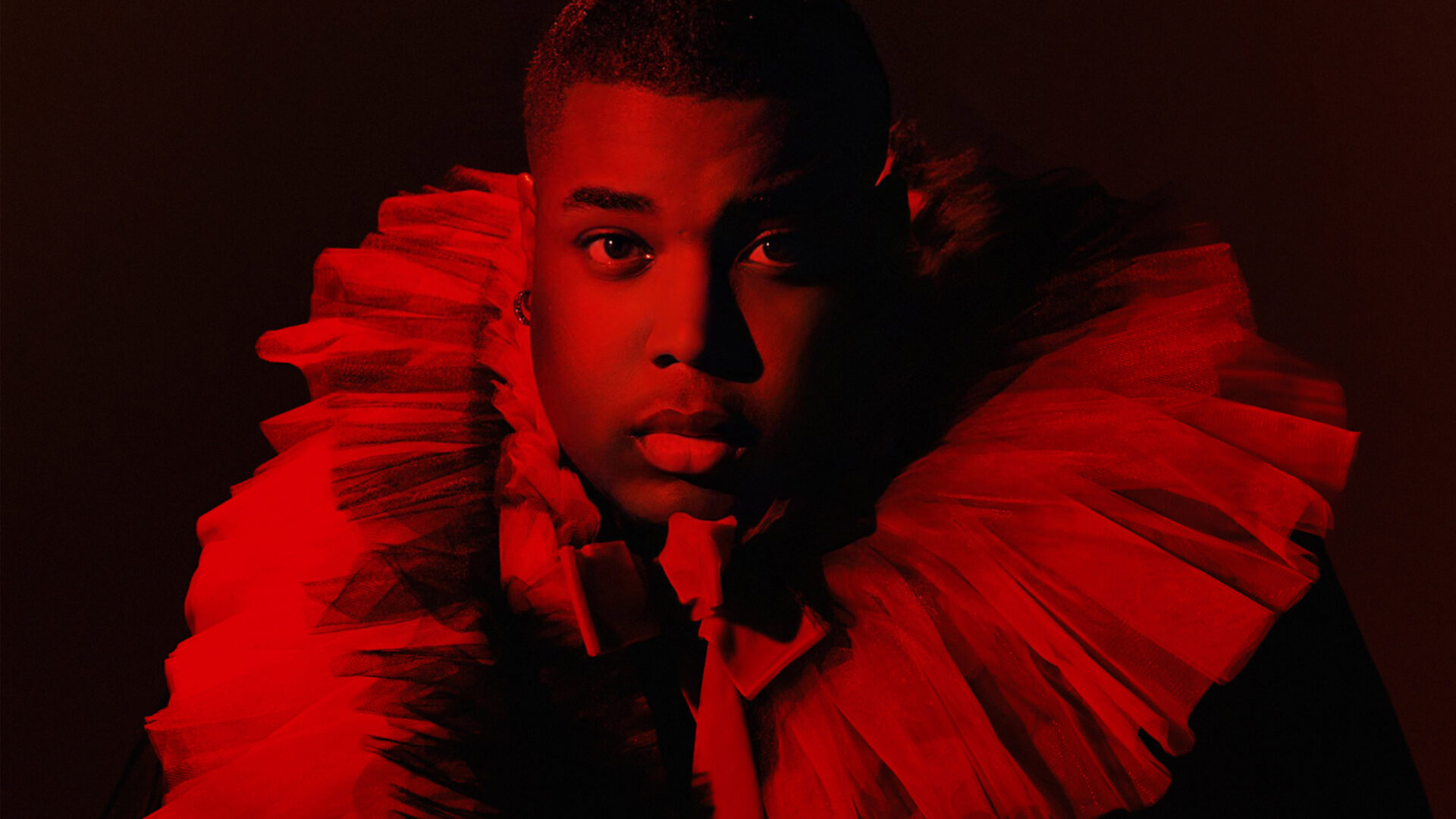
The booming voice of Jacob Lusk – an honouree at the year’s Virgin Atlantic Attitude Awards, powered by Jaguar – almost perforates the dressing room’s brick wall as it travels across the photography studio: “Man of God!” he calls out in delight. “This jacket is everything!” His eyes beam as we follow Attitude’s fashion director into the dressing room where Lusk is running his eyes across the rails of clothes comprised mostly of elaborate capes that have become the singer-songwriter’s signature look. “Can I have this? I have to have this,” Lusk says excitedly, wrapping the voluminous yellow Patrick McDowell jacket around his shoulders, that, to be fair, I’m having a similar reaction to.
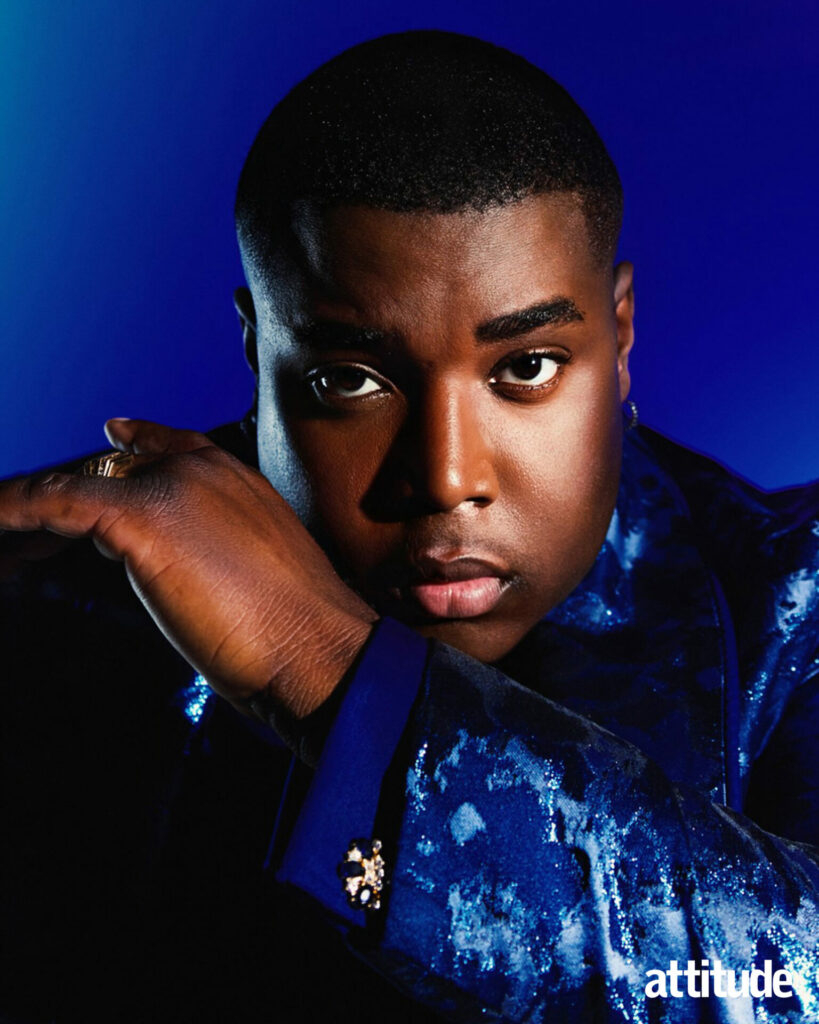
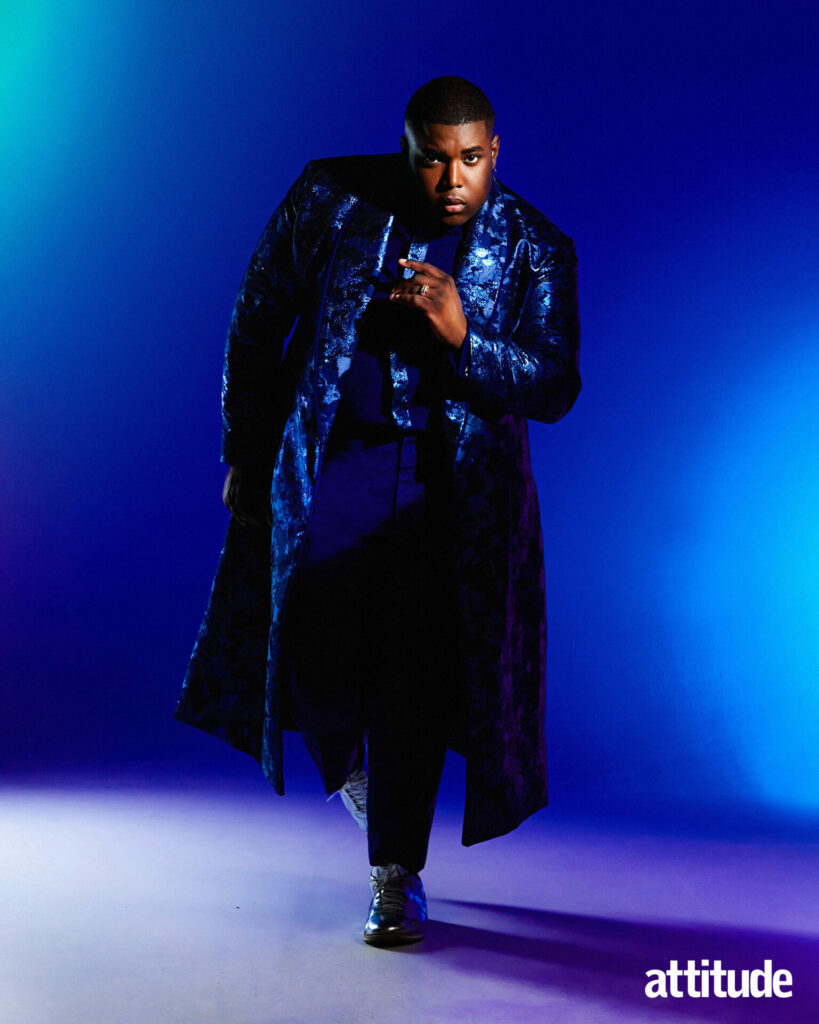
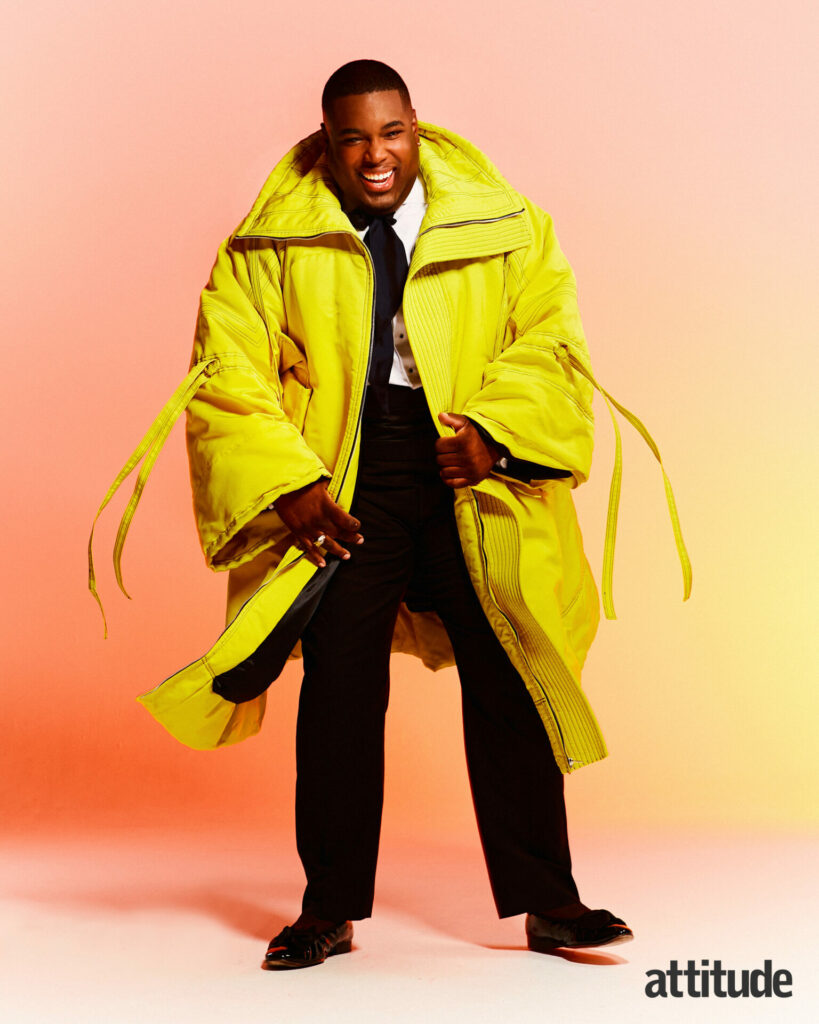
At 6ft 3ins, Lusk is an imposing presence in the room, but his demeanour is every bit the gentle giant. There’s not an ounce of the diva that one might presume a singer who commands such an epic voice might carry with them. As we begin the shoot, Lusk apologises if he appears lacking in energy. “I’m sorry, I’m tired today,” he says sincerely after having flown to London from Japan the night before. If this is ‘low-energy Lusk’, then ‘high-energy Lusk’ must exist somewhere in the heavens. Which, I find out later, is not too far removed from the truth when we get into his belief in a higher being.
A deserved Attitude Awards 2023 Breakthrough Award-winner, Lusk is one third of Gabriels, which is completed by Ryan Hope and Ari Balouzian. Named after St Gabriel’s Avenue in Sunderland, where Hope hails from, the three-piece came to prominence in 2021 after releasing debut EP Love and Hate in a Different Time, a slice of vintage soul performed through a modern lens that was hailed by Elton John as “one of the most seminal records” he’d heard in the past 10 years. As praise goes, that’s a blessing from a musical god. The band’s debut album Angels & Queens — Part II was released to universal acclaim in July this year, went on to chart at number three and was lauded by the Guardian as a contender for album of the year.
The album release followed another standout moment for Lusk when he was invited by Elton John to join the legend’s first and final Glastonbury set to deliver a thundering duet on ‘Are You Ready For Love’, bedecked in a popping pink suit. “Every time I see him, I get nervous,” Lusk says of the Rocket Man. “I can’t even text him, I can’t even call him,” his eyes widen in disbelief as he recalls their experience of working together.
It’s almost freaky how Gabriels have made instant success seem as effortless as Lusk’s soaring vocals, which have been likened to channelling the energy of Nina Simone and Billie Holiday. Keen to embrace opportunity, earlier this summer Lusk showcased his vocal versatility by embodying the spirit of his musical hero Sylvester when he featured on The Blessed Madonna dance track ‘Mercy’. The video to the song is a stunning celebration of queerness and clubbing.
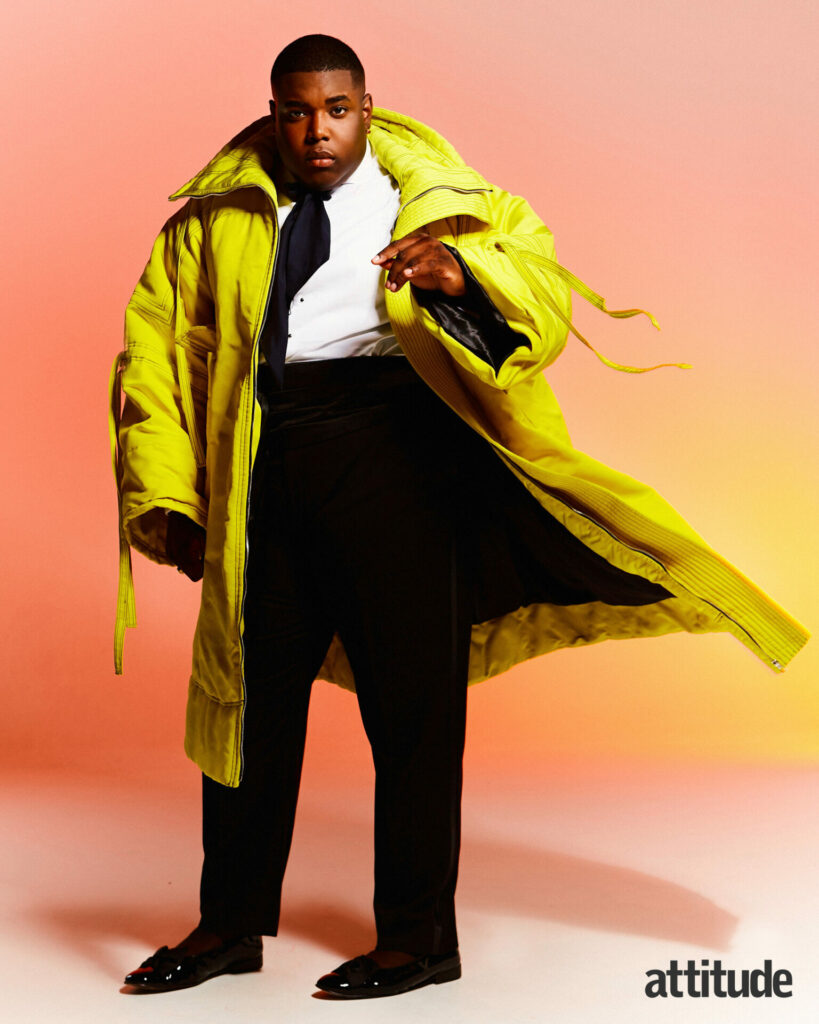
But this isn’t Lusk’s first step onto fame’s fierce stage, having been first introduced to the media’s glare after he came fifth on American Idol in 2011. “I wasn’t looking to be in the public eye. I wasn’t trying to be famous,” Lusk says when we sit down for our interview a couple of weeks later in White City, west London, where he’s planning to set up permanent residence next year. “I just wanted to sing and not be broke,” he says of going on the US reality TV show that over the years has generated far greater and more reputable stars than its British counterpart, The X Factor. The intense scrutiny that came with being on what was then one of America’s biggest television shows pushed Lusk away from seeking pop stardom. Not being open about his sexuality on the show was a tough path to navigate during the early days of a social media-centric world that was then even less sympathetic than it is now.
Today, when it comes to his emotions, Lusk is embracing being more open. As we talk, he shares updates on his current love interests: “But that’s off the record,” he winks, as we discuss the ups and downs of dating as a person that now has to balance living with a newly found public profile with acute social anxiety. “I used to say anxiety wasn’t real. I was like, ‘They ain’t got anxiety. They need a whooping. They need some discipline.’ And now I’m like, ‘Ooh. OK, I get it,’” Lusk’s voice quietens, before rising again. “I think God was like, ‘Huh. OK, let me show you what anxiety is, motherfucker: here!’”
Part of his social anxiety, he believes, is down to his American Idol experience. “I wasn’t famous in real life, but I was on a big TV show. And I think that [contributed] to it. Because you’re always worried about what people are looking at and what they’re saying. Some of the worst comments I got were from members of the [queer] community.” While Lusk was in no way closeted in his private life during those American Idol years, he wasn’t ready to be publicly open at a time when there were few openly LGBTQ+ recording artists. Owning his queer identity would be a hurdle that he would face when fame came calling for him a decade later.
Being on American Idol was anathema to everything Lusk loved about singing. For him, the joy in singing comes naturally; it permeates outward from deep down in his soul. The show felt constructed, rigid. “I think I always could sing, I just didn’t realise that it was more special or different,” he says humbly. It was never something he saw as a gift, or that he thought set him apart from others. “I mean, everybody could sing at church, and everybody could sing at school. I don’t think I realised that what I had was anything different. Even now, I caution myself. People are like, ‘Oh my God, your voice is …’ And I am like, ‘That’s cute, but don’t nobody really care about that.’ I can do all these vocal acrobatics and all these high notes, but it’s really how you make people feel. It needs to come from your heart.”
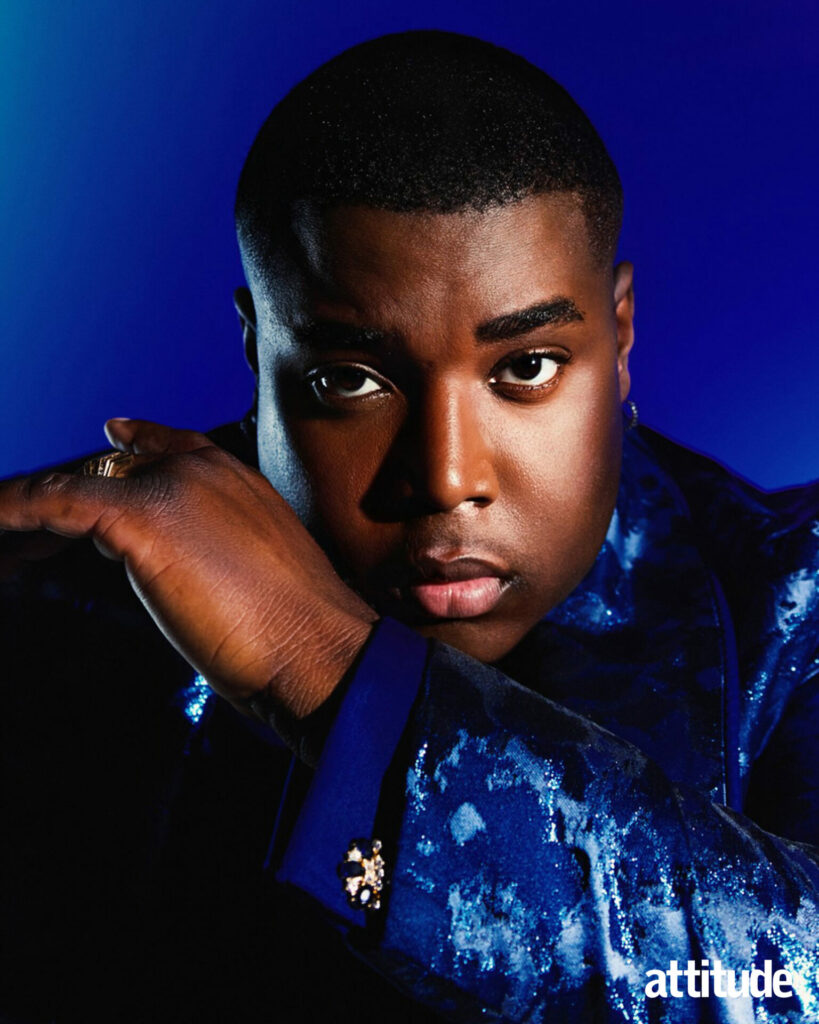
His early years growing up in Compton, California, were all about community: playing outdoors, summers by the pool, drinking from the water hose, skating on rollerblades. They are mostly happy memories, although some are tinged with sadness. “I got beat up in third grade. I was bullied. I don’t even remember what it was for, to be honest. Don’t think nobody was calling me gay or anything,” he recalls. Life would deal him another heavy blow when, aged 12, his father died. “It was like, ‘Oh shit. All right, here’s life.’ He died suddenly. His sugar got high or something and they gave him a shot of insulin. His heart couldn’t handle insulin.
“It makes you look at the world differently. As a defence mechanism, I killed everybody off in my life. I was like, ‘My mom and grandmother, they’re always together, so they’re going to die together in a car accident.’ And this person’s going to die, and that person. For me, I was like, ‘People just die. That’s what life is.’”
The early death of his father would sit in the shadow of his psyche until very recently when he addressed the loss in therapy. “When my father died, all of my affection ended,” he says. “My mother was not affectionate. My grandmother was not affectionate. I was looking for affection so badly that anybody that gave it to me, they were the one.”
Therapy has only been an extension of the cathartic process of self-reflection that co-founding Gabriels would deliver. Bandmates Hope and Balouzian reached out to Lusk for a commercial job while he was working with a church choir, which led to the pair proposing they form Gabriels. “We didn’t know each other. I didn’t know their family, where they came from; they didn’t know my family,” says Lusk. He took the chance and went for it. The recording sessions saw the band drive out to Hope’s home in Palm Springs for week-long writing sessions. “We went to this place we didn’t know, with people that we didn’t know. But it gave us this space where we could talk about everything or anything and ain’t nobody gonna know. It was literally like therapy. We would do it every few months.”
The sessions saw Hope and Balouzian push Lusk to open up about aspects of his emotions that had long since been buried. “They said, ‘Jacob, it’s OK to be yourself.’ They’re very straight, not gay at all, very manly men, not even a little bit gay, but we were able to talk about anything. We had conversations about race.” Being part of a trio under the moniker of Gabriels gave Lusk the safety net to explore his identity: “It gave me some anonymity to say what I wanted to say, wear what I wanted to wear.”
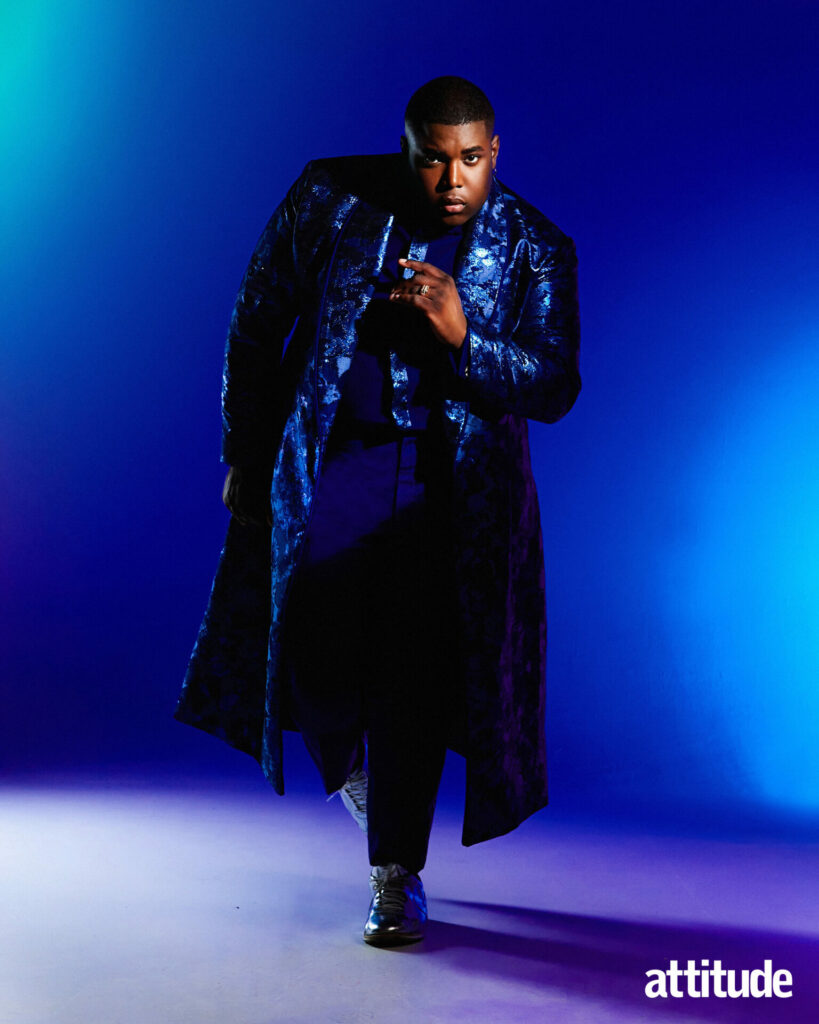
The songs they would create dived deep emotionally from the outset. Their first standout song ‘Love and Hate in a Different Time’ was born of the band’s shared experience of death. Lusk sings the opening lines back to me, note-perfect: “Last few years that I have seen / Walking dead all around me / Silent fears, neatly folded dreams / Catacombs, Black Sea surrounding / Catacombs, Black Sea surrounding / Even in the valley.”
“It came from a period in my life where all these people were dying,” says Lusk. “Somebody I had dated had died, and then Covid happened. When we write the songs, we ask, ‘How do we draw this line so it’s inclusive of everybody?’ I like to say there’s more things that make us alike than make us different.”
Death is a recurring theme in several of the tracks on Angels and Queens. One of its most powerful songs, ‘Great Wind’, is about a closeted musician that Lusk dated who struggled with their sexuality. “He was giving me gay when we met, and we started talking. Gay culture does glorify the straight guy, the DL guy, which is like ‘eyurgh’ to me. I don’t want you if you don’t want me. I don’t want to be trying to get you to cross over,” says Lusk of their affair, which would last eight years, on and off. “We ended up moving into the same building. I was like, ‘OK, now we got easy access,’” he says, a cheeky look in his eye.
“He was at a low in his life, I was at a low in mine. I ended up getting a job taking orders for a home shopping network show. He was like ‘You got a job?’ I was like ‘Yeah, n***a, I gotta eat!’ So, he ended up getting a job mentoring young people to help them transition out of foster care.”
After one of the breaks in their relationship when they didn’t see each other for close to a year, the guy reappeared and surprised Lusk at church. “We went to the park to talk and he apologises, in his way. He was like, ‘You really liked me for me.’ He didn’t need to be this thug thing. I said, ‘It’s OK if you want to be held.’ So, then we started dating seriously.”
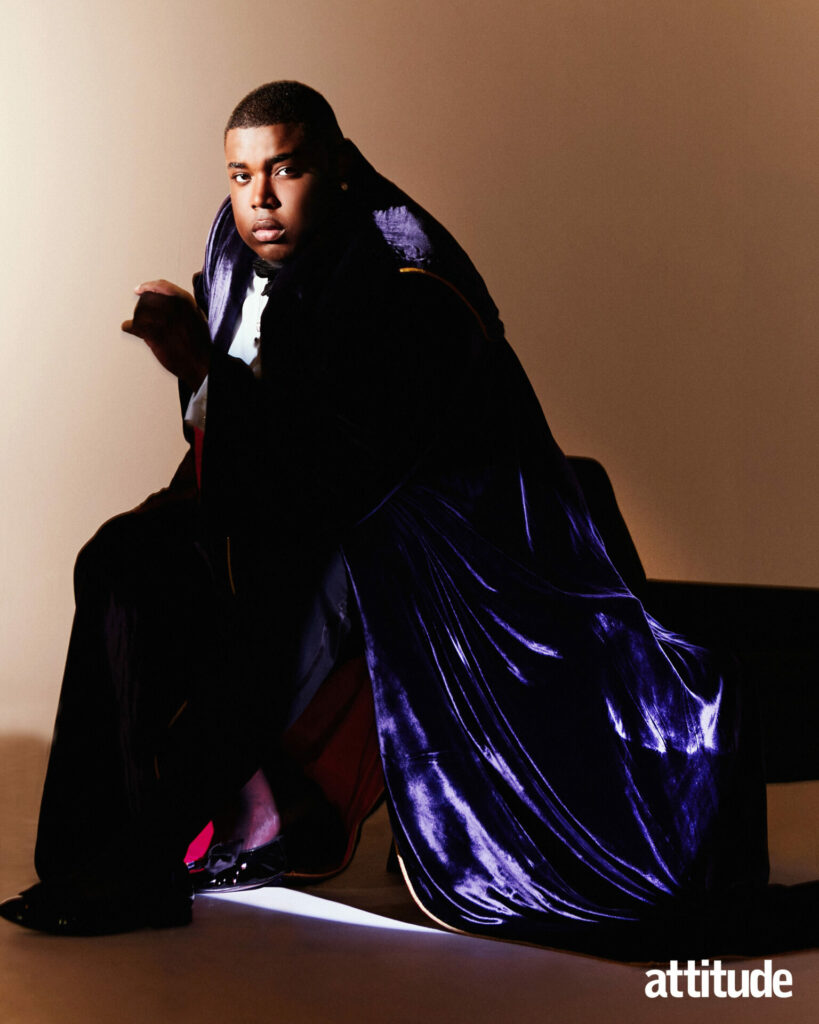
Lusk leans in closer as he recalls the story: “He went to Vegas, then Atlanta for a gig, came back to LA, went to work and dropped dead. That year prior, when he disappeared, he was in the hospital with heart issues. Maybe that’s what made him make the leap. And that’s where ‘Great Wind’ comes from. Imagine you finally get to this place where you are OK with yourself, and then… damn, you’re gone.”
While the song carries personal resonance for Lusk, it’s also written in tribute to his Gabriels bandmate Hope, whose mother died not long before they began recording. “His mom… it’s a little different than a guy that I dated, obviously,” says Lusk. “But she had cancer, and she actually didn’t tell nobody she was sick until the very end. And she wrote all these letters and left all these little messages all around the house. And one of them said, ‘If you love somebody, tell them every day.’ So, that was how we opened the song.”
Elsewhere, the album doesn’t shy away from Lusk exploring his personal life. “They’re all personal. ‘Taboo’, that was me messing with a musician in the industry. ‘Blame’ was a man that I was dating, which is not on the album, but we perform it live.”
When it comes to his sexuality, Lusk has only recently been on the journey to understanding the power of being so honest, even if affixing a label to his identity is something he still finds challenging. “I struggle because I don’t really like none of the words, to be honest. At first, I didn’t talk about it at all. I wouldn’t do interviews. I was like, ‘Fuck that. I’m not interested. I’m not talking about it. I’m going to sing, and that’s it,’” he says.
That position would shift when the band went on the road as support act to one of the world’s biggest pop stars. “At the time, some people, who will remain nameless, didn’t want us to do the Harry Styles tour because they were like, ‘There’s no way these little young white kids are going to like you old people doing this soul music with these strings and this boy singing like Nina Simone. There’s no way that Harry Styles’s people are going to like it.’ Well, they let us do it. And even I was worried about it,” says Lusk.
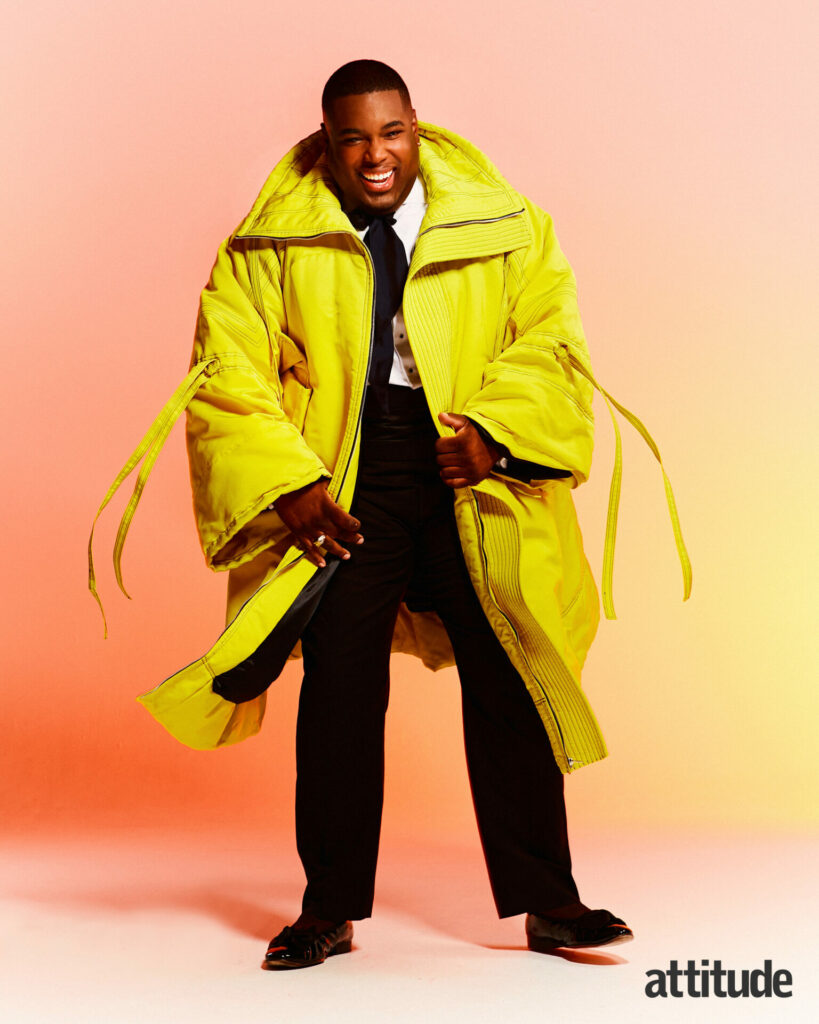
“So, we did these shows with Harry Styles, and there was a young person who I believe identifies as non-binary. We’re now besties on Instagram and we message each other. That young person was Caucasian with blonde hair. They were a little chubby, grew up in the Midwest with rich parents. Very different than what I am like,” says Lusk. “But that young person saw themselves in me, and I was like, ‘Oh,’ because I was thinking, ‘Ain’t nobody out here looking at me. I go to church, I’m sober. I don’t do this, I don’t do that.’ Actually, there are a lot of young people who need to see me and need to know, actually, it’s OK, so that they don’t feel alone. I think it’s important that people see healthy examples of other people thriving.”
Lusk says his journey to finding a place within the queer community has been a volatile one. “My weight has fluctuated, I’ve gained and lost 100 pounds a couple of times. I’ve been skinny, I’ve been both. But I’ve had people tell me like, ‘Oh, we can’t even hang out or be friends because you’re chubby.’ And I was like, ‘Wait, but we’re friends. We’re not having sex. What does that have to do with anything?’ I went through a phase when I didn’t feel very beautiful, or when I didn’t think other people thought I was beautiful.”
The support of Hope and Balouzian gave Lusk an unexpected confidence. “I now had these two straight men who have a certain privilege in the world, and by them affirming me, it gave me a different level of strength that I didn’t have before,” he says of their support. “They saw me, and it wasn’t attached to them getting something from me, trying to have sex with me. I think if we did more of that, we’d see people blossom in a different way.”
Starting the band also gave Lusk the chance to see his American Idol experience with fresh perspective. “When I did Idol, I was really saddened because I got so much flack. One of our backing singers [in Gabriels] is trans, and she said, ‘You don’t understand. You were one of the first people I saw on a prime-time television show that made me go, ‘Oh, I can do this, too.’”
When it comes to his faith, Lusk shares his love of God and Jesus with pride. “People fear religion because they’ve been abused by it. Let’s be honest, the church has been flawed from the beginning. They were using the church to manipulate people all over the world, not just to enslave people in America, but also the Catholic Church, the Queen of England,” says Lusk, bluntly.
“I grew up in a house that was very religious, very strict. I didn’t go to the movies, I didn’t listen to the radio. My momma wasn’t having sex, my grandma wasn’t having sex, and that’s probably why she’s uptight. I saw my momma the other day, and I said, ‘Momma, we can get you a tune-up. The Lord is not going to be mad, he gonna be all right with you,’” he laughs as we discuss his open belief in a higher being that is far removed from the judgmental god of many religious zealots.
Sexual pleasure, he extols, is as natural to the human body as breathing. “If I can’t tell you that I did it, then I shouldn’t be doing it. I’m a human being,” Lusk says, taking our conversation back to his story about his recent romantic escapade that had him meet a composer he was romantically involved with in Austria. It was all good, he explains, until it went wrong. “Even in that, me telling the truth, frees me. And the Bible says, the truth shall set you free. I think a lot of the things we go through is because people are not telling the truth. Most of us had to explore what we were in secret. And that affects how we move into adulthood.”
Lusk says living truthfully — indeed, authentically — is increasingly manifesting itself in a society where people are becoming more comfortable embracing, and being open about, their multitudinous identities. “Now, you can have whatever relationship you want: you can have pan, you can have poly… and I honestly do believe the world is moving to a place where this stuff isn’t even going to matter, because these young kids, they get it,” he says affirmatively. “I think that’s why there are so many non-binary people — they are not defined by that stuff.”
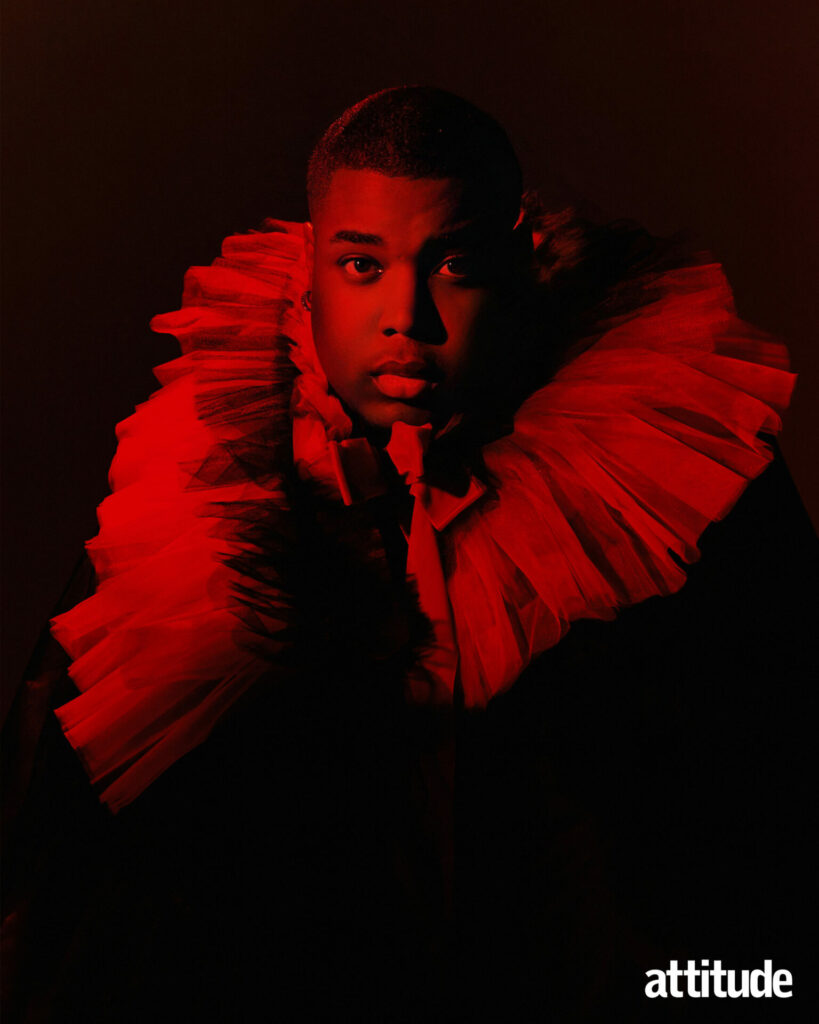
Extreme religious doctrine couldn’t be further from Lusk’s perception of what it means to love his God in his way. “I don’t worship God or love God because of heaven or hell; that’s fucking crazy. That’s fearmongering,” he says, slapping a hand on the table and throwing a dismissive side-eye at the concept of eternal damnation. “There was this guy who was like, ‘Why would I believe in a god that doesn’t believe in me?’ I was like, ‘Who told you that?’ Because I love somebody, that’s going to send me to eternal hell? That don’t make sense,” Lusk says, shaking his head disbelievingly at the notion of a judgemental old bearded man in the sky.
Enlightenment came to him in a distinct moment, Lusk recalls. “At school I was a stick with a big ol’ butt. I asked the Lord: ‘Why did you make me like this, why don’t I look like the other boys?’ And I remember hearing this thing come so clearly back to me: ‘I made you this way for a reason — you’re going to be a safe space for a lot of people.’ We all got that inner voice within us that tells us, ‘That’s not right, that’s wrong.’ We all have it, whether you believe how I believe or whether you don’t, you have it.”
“Have I called you ‘man of God?’” he asks me, harkening back to his Attitude cover shoot a couple weeks earlier. Lusk recalls the first time he met Celeste, with whom he shares management, and how he called her ‘woman of God’. “She had a meltdown! She was like ‘Oh no, not me!’ I was like, ‘You are,’” he says as he places a soft hand on the table, his voice steady, his words calm and measured. “The Bible says you are a god or a goddess on the Earth. You have the power to create whatever life you want, you can be whoever you want to be. You can speak to the mountain to make it move, and it has to move. You literally have so much power within you. Even if you say you don’t believe in God, there is still a power in you, even if you are the power. You are a God person. You are powerful, you don’t have to take less, you don’t have to accept that. You are a God on the Earth.”
Lusk sits back, his smile exuding joy. Here is a man who has walked through shame and self-doubt, and today is at peace within himself, while still being fully aware that there is so much more for him to discover. “You can have your own relationship with a creator, with a divine power, whatever you want to call it,” he says, assuredly. “For me, it gave me the courage and the power to know I was OK.”
Words Cliff Joannou Photography Azazel Fashion & creative direction Joseph Kocharian
The Attitude Awards issue is out now.
